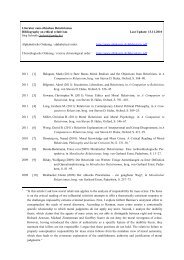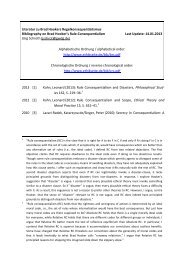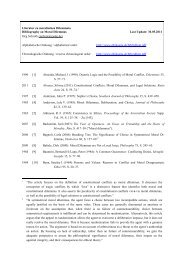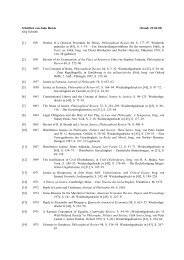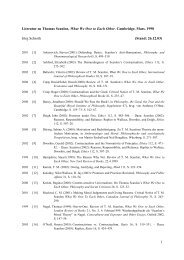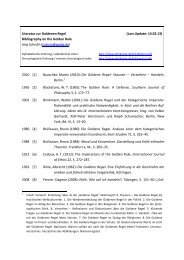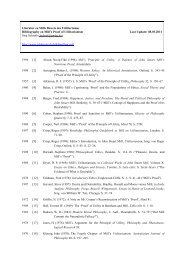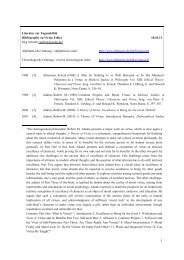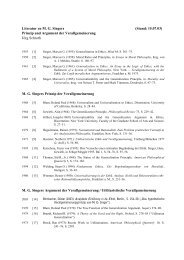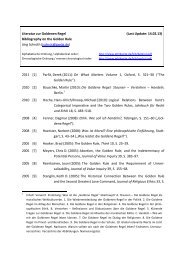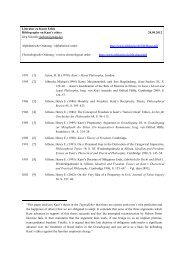Chronologische - Ethikseite
Chronologische - Ethikseite
Chronologische - Ethikseite
You also want an ePaper? Increase the reach of your titles
YUMPU automatically turns print PDFs into web optimized ePapers that Google loves.
2, hrsg. von B. Sharon Byrd, Joachim Hruschka und Jan C. Joerden, S. 113–41.<br />
1994 [871] Wagner, Hans (1994): Kants Konzept von hypothetischen Imperativen, Kant-Studien 85, S.<br />
78–84.<br />
1994 [872] Wichmann, Heinz (1994): Probleme der Kantischen Ethik. Überlegungen im Anschluß an Paul<br />
Menzers kritische Betrachtung, Kant-Studien 85, S. 303–308.<br />
1993 [873] Allison, Henry E. (1993): Kant’s Doctrine of Obligatory Ends, Jahrbuch für Recht und Ethik 1.<br />
Wiederabgedruckt in Allison, Idealism and Freedom. Essays on Kant’s Theoretical<br />
and Practical Philosophy, Cambridge 1996, S. 155–68. 140 – Vgl. dazu [897].<br />
1993 [874] Baier, Annette (1993): Moralism and Cruelty: Reflections on Hume and Kant, Ethics 103, S.<br />
436–57. Wiederabgedruckt in Baier, Moral Prejudices. Essays on Ethics, Cambridge,<br />
Mass. 1995, S. 268–93.<br />
1993 [875] Becker, Don (1993): Kant’s Moral and Political Philosophy, in The Age of German Idealism,<br />
hrsg. von Robert C. Solomon und Kathleen Higgins, London, New York, S. 68–102<br />
(Routledge History of Philosophy vol. 6).<br />
1993 [876] Billington, Ray (1993): Living Philosophy. An Introduction to Moral Thought, London, S.<br />
109–31 (“Ends and Means I: Kant”).<br />
1993 [877] Brandt, Reinhard (1993): Gerechtigkeit bei Kant, Jahrbuch für Recht und Ethik 1, hrsg. von B.<br />
Sharon Byrd, Joachim Hruschka und Jan C. Joerden, S. 25–44. 141<br />
1993 [878] Forschner, Maximilian (1993): Über das Glück des Menschen. Aristoteles, Epikur, Stoa,<br />
Thomas von Aquin, Darmstadt, S. 107–50 („Moralität und Glückseligkeit in Kants<br />
Reflexionen“).<br />
1993 [879] Freudiger, Jürg (1993): Kants Begründung der praktischen Philosophie. Systematische<br />
Stellung, Methode und Argumentationsstruktur der „Grundlegung zur Metaphysik der<br />
Sitten“, Bern, Stuttgart, Wien.<br />
1993 [880] Gregor, Mary (1993): Kant on Obligation, Rights, and Virtue, Jahrbuch für Recht und Ethik 1,<br />
S. 69–102.<br />
140 “This paper analyzes Kant’s thesis in the Tugendlehre that there are certain ends (one’s own perfection and<br />
the happiness of others) that we are obligated to adopt. It contends that none of the three arguments which<br />
Kant advances in support of this thesis succeeds and that the attempted reconstruction by Nelson Potter<br />
likewise fails. It then maintains that the argument does work, if one brings in, as an implicit premise,<br />
transcendental freedom. Finally, it is argued that this late doctrine of obligatory ends marks a significant<br />
advance over the treatment of broad duties in the Grundlegung and can serve as a basis for defending<br />
Kant’s ethics against the familiar emptiness charge.”<br />
141 “Kant’s ethics do not include a discussion of justice as a specific virtue, and the “Metaphysical First<br />
Principles of the Doctrine of Right” appear to deal only with private and public law, but not with justice. In<br />
fact, Kant’s ethics in the three Critiques and later relevant writings is dependent on God’s iustitia<br />
distributiva as the highest good and the institution of the state is labelled as “public justice”. This article<br />
attempts to explain this connection and to provide a contribution to the topic of Kantian justice. The<br />
Epilogue to this article discusses a letter dated November 6, 1790, which Kant wrote in one of his official<br />
capacities at the University of Königsberg and which as of yet has remained unpublished.”



